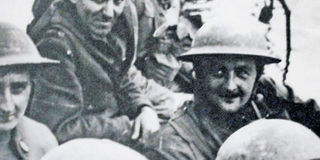Dunkirk: The best war film ever?

Film critics have praised Dunkirk as Christopher Nolan’s best film so far; some have claimed it is the best war film ever. PHOTO| JOHN FOX
What you need to know:
- Film critics have praised Dunkirk as Christopher Nolan’s best film so far; some have claimed it is the best war film ever.
- For me, the most striking feature of the film is the way Nolan found a dramatic focus in order to cope with an event of such an enormous scale.
- He chose to concentrate on three different scenarios that occur at different times: one on the beach, lasting for one week; one on the sea, lasting for one day; one in the air, lasting for one hour.
- These are the separate threads that are interwoven to make the film’s narrative.
Last Sunday I should have been in Mogadishu. But mid-day Saturday my Somali colleague called with the news that the Permanent Secretary we were going to meet for consultations had been suspended.
So, instead of having to get up at 3.30 am to be at JKIA by 4.45 (trips to Somalia are tough having to suffer such early flights) I had a restful Sunday ahead.
But what do we do?
“How about we have a family trip in the evening to see Dunkirk?” my son, Andreas, suggested. He was not talking about the place, the seaport in France, but about the film that has been having such good reviews and which has just opened in Nairobi cinemas.
Andreas added: “With your time flying in the RAF, you might be able to fill in some of the background. I have read that the film has some fantastic dogfights.”
It took me back to the time when, on a family holiday in France, we went with our young daughters to see the Normandy beaches on the northern coast of France.
As we looked down along the miles and miles of wide sands, I could imagine how terrifying it must have been for the thousands of British and American soldiers leaving their assault crafts and being exposed to the gunfire from the line of hills.
For myself, I had some idea of how it must have been for those men. I had grown to consciousness at a time of war – the Second World War. One night, a string of bombs had fallen in a field very close to our house in rural Lincolnshire.
I had gone to sleep many nights to the drone of the British Lancaster bombers on their way to Germany across the North Sea. Then, some years after the war, I had experienced two years learning to fly in the Royal Air Force.
But whether our two young daughters, looking at the empty beaches, had a sharp sense of how it must have been for the invading army, I doubt.
Those D-Day Normandy landings were the beginning of the end for the war in Europe. But the Dunkirk film tells a story from the early phase of the war, in 1940 – when more than 400,000 soldiers of the British Expeditionary Force were stranded on the Dunkirk, Calais and Ostend beaches, surrounded and pounded by the German Army.
Dunkirk is scripted, directed and co-produced by Christopher Nolan, well-known and widely acclaimed for previous films such as Insomnia, The Dark Night Trilogy and Inception. Among the actors are Tom Hardy, Cillian Murphy, and the former One Direction band member, Harry Styles.
It has a very dramatic music score by Hans Zimmer. It employs thousands of extras on the beaches, a re-assembled flotilla of small boats of the kind that engaged in the evacuation of troops back across the English Channel, and authentic aeroplanes in the skies above – the RAF Spitfires and the Luftwaffe Heinkels and Dorniers.
Film critics have praised Dunkirk as Christopher Nolan’s best film so far; some have claimed it is the best war film ever.
For me, the most striking feature of the film is the way Nolan found a dramatic focus in order to cope with an event of such an enormous scale.
He chose to concentrate on three different scenarios that occur at different times: one on the beach, lasting for one week; one on the sea, lasting for one day; one in the air, lasting for one hour. These are the separate threads that are interwoven to make the film’s narrative.
And so the evacuation that rescued 300,000 British soldiers is mainly presented as experienced by only a few of them – a dozen or so infantrymen desperate to get away; a father and son who cross the sea in their small boat to help in the rescue; three Spitfire pilots who engage in dogfights with German fighter planes and bombers.
There is no sentimentality, patriotism or jingoism in Dunkirk; no glamour. I grew up with British newspapers showing bullet-headed caricatures of the German enemy.
No German face is shown in this film. Only one of the famous speeches by the British war leader, Winston Churchill, is featured – and that is read out flatly from a newspaper by one of the shell-shocked and exhausted soldiers when they get off their little boat at a seaside town in Dorset.
Wilfred Owen, the English poet of the First World War, said that he was writing about the pity of war. I guess that Christopher Nolan would say the same thing of his Dunkirk.
It is not a film to enjoy; it is one to be appreciated. I think what motivated Nolan was to show something of the reality, the horror and, at times, the bravery of war – as felt and done by ordinary men and women.





